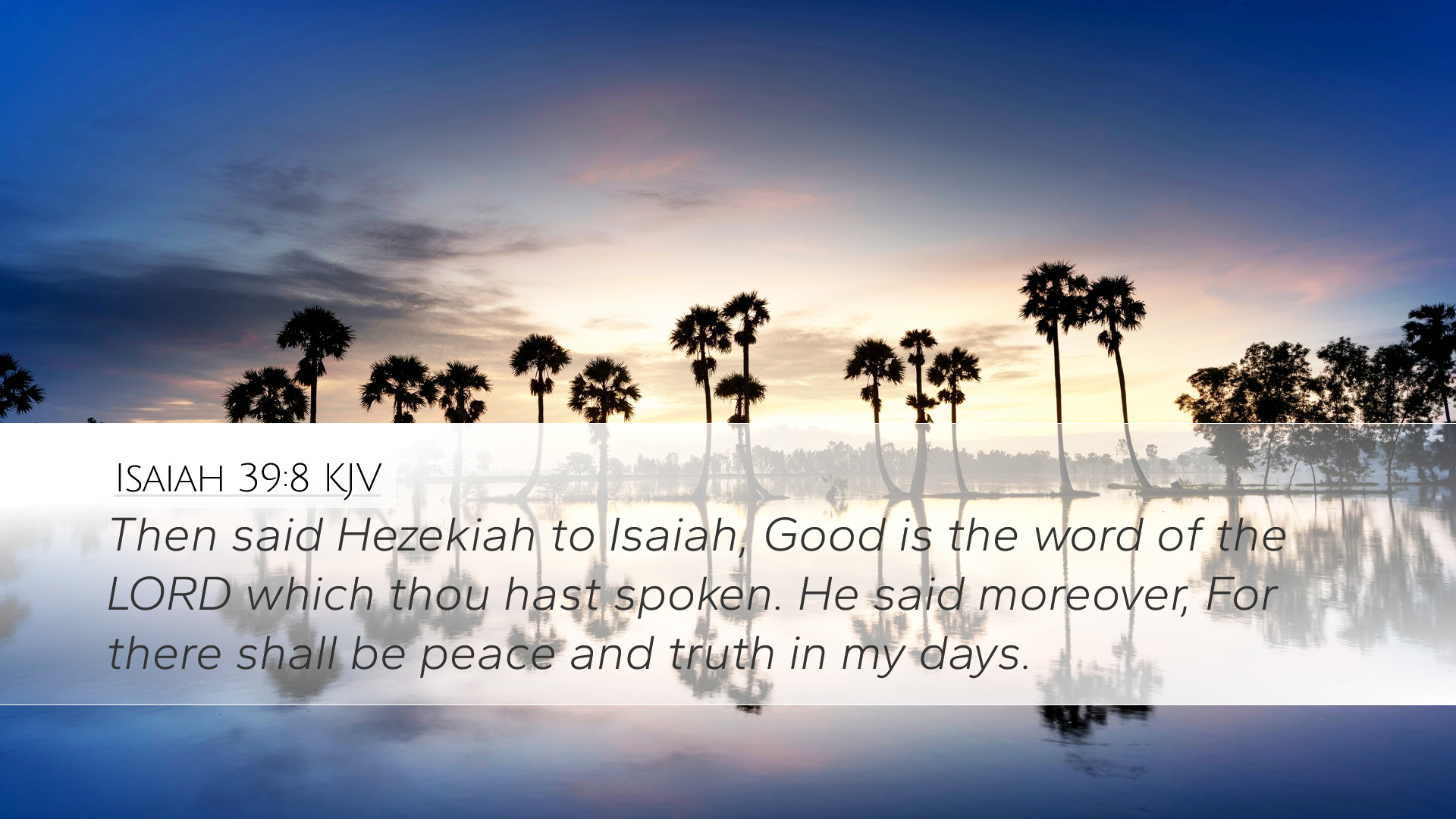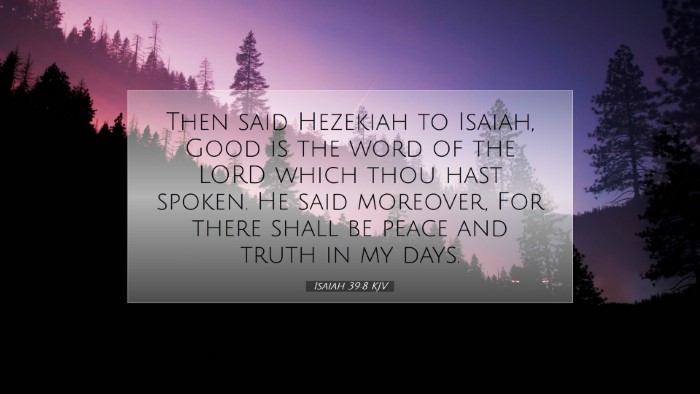Commentary on Isaiah 39:8
Isaiah 39:8 reads: "Then said Hezekiah to Isaiah, ‘The word of the LORD which you have spoken is good.’ For he thought, ‘At least there will be peace and truth in my days.’” This verse encapsulates a significant moment in King Hezekiah's life, reflecting both his faith and his shortcomings as a leader, and offers rich insights for pastors, theologians, and students of Scripture.
Contextual Background
Understanding Isaiah 39:8 requires an exploration of its historical and literary context. This chapter occurs shortly after Hezekiah's miraculous deliverance from the Assyrian siege (Isaiah 37) and follows his serious illness and subsequent healing (Isaiah 38). These divine interventions highlight God's sovereignty and faithfulness toward His people.
Hezekiah's Character and Actions
Hezekiah is often viewed as a king who deeply committed himself to reform and faithfulness to God. However, this moment reveals a significant flaw. Instead of seeking further divine intervention or consulting God’s will for the future of Judah after the Assyrian threat, he appears more concerned with his personal peace and security.
Public Domain Commentary Insights
- Matthew Henry: Henry suggests that Hezekiah’s response reflects a failure to consider the broader implications of God’s prophecy. Instead of expressing concern for the nation’s future, Hezekiah seems self-focused, demonstrating a tendency to be complacent in light of God’s mercy.
- Albert Barnes: Barnes adds that Hezekiah’s comment, "The word of the LORD which you have spoken is good," may signify a resignation to the prophetic word but also hints at a profound lack of spiritual zeal. Hezekiah does not fully grasp the seriousness of the consequences that will arise from the Babylonian invasion, which is foretold by Isaiah.
- Adam Clarke: Clarke interprets Hezekiah’s response as a sign of his declining resolve. He highlights that Hezekiah's contentment with the peaceful days he would enjoy suggests a troubling attitude towards the welfare of future generations—he seems to prioritize his comfort over the impending judgment his descendants would face.
Theological Implications
This verse raises crucial theological questions about leadership, accountability, and the nature of God's promises:
- The Role of a Leader: Hezekiah's reaction serves as a cautionary tale for leaders. It encourages them to look beyond immediate circumstances and consider the long-term effects of their decisions on the people they lead. A godly leader should demonstrate concern not only for their own welfare but also for the future of their nation and its relationship with God.
- Understanding Prophecy: The passage highlights the importance of understanding and heeding prophetic warnings. The comfort Hezekiah finds in the "good" word of the Lord underlines a human tendency to overlook difficult truths when they seem personally inconvenient.
- God’s Sovereignty and Mercy: Even within Hezekiah's failure, God's sovereignty prevails. This narrative assures readers that despite human shortcomings, God's plan will unfold according to His purpose, emphasizing His mercy while remaining just.
Practical Applications
There are several practical lessons that can be drawn from Isaiah 39:8 for contemporary believers:
- Evaluate Personal Priorities: Like Hezekiah, individuals may need to evaluate their priorities. Are they focused solely on their comfort and security, or are they also considering how their faithfulness affects future generations?
- Responding to God's Word: The call is to respond to God's prophetic word with discernment and obedience, rather than complacency. Believers should cultivate an attitude of seeking God's guidance in all aspects of life.
- Awareness of Future Generations: There is a profound responsibility to be vigilant and proactive in nurturing a legacy of faith. Pastors and church leaders are called to instill in their communities the importance of a robust engagement with Scripture and the implications of living faithfully in a challenging world.
Conclusion
Isaiah 39:8 serves as a powerful reminder of the complexity of human nature, the challenges of leadership, and the enduring sovereignty of God. The insights from public domain commentaries by Matthew Henry, Albert Barnes, and Adam Clarke encourage a deeper reflection on the implications of one’s spiritual maturity and leadership responsibilities. May this analysis foster a commitment to faithfulness that considers both our present circumstances and future generations.


